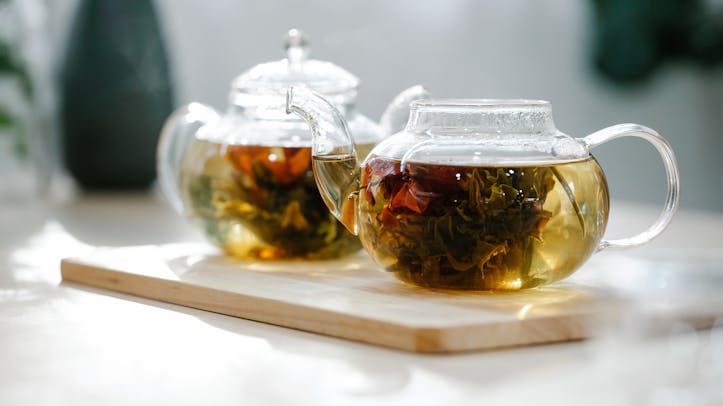Fasting Tea: Unlocking the Benefits of Herbal Infusions

When it comes to enhancing the fasting experience, herbal tea and fasting synergize to create a harmonious balance. Whether you’re a seasoned faster or new to the practice, incorporating a fasting tea, specifically herbal infusions, can significantly benefit your routine. Let’s delve into how these teas can support your fasting journey and which herbal teas are best-suited for your fasting needs.
The Role of Herbal Tea in Fasting
Fasting, the voluntary abstinence from food for a certain period, is a practice that has been part of human culture for centuries, often associated with religious rituals, health practices, or even political protest. Introducing herbal tea into a fasting regimen can aid in maintaining hydration, provide a sense of satiety, and offer various health benefits without breaking the fast.
Hydration and Satiety: During fasting, staying well-hydrated is crucial. Herbal teas are an excellent way to ensure hydration while adding some variety in taste and flavor. Unlike caffeinated teas or coffee, which can sometimes lead to dehydration, herbal teas are generally free from caffeine and can be consumed in abundance without negative effects. Additionally, the warm nature of tea can help suppress appetite, providing a feeling of fullness and reducing the urge to eat.
Health Benefits: Many herbs used in fasting teas have their own unique health benefits. Some may aid digestion, support liver function, or provide anti-inflammatory properties, which can be particularly helpful during a fast when the body is in a state of detoxification.
Selecting the Right Herbal Tea for Fasting
When choosing a fasting tea, it’s essential to opt for caffeine-free herbal options. Some popular choices include:
- Peppermint Tea: Known for its digestive benefits, peppermint tea can help ease stomach discomfort and is refreshing to taste.
- Chamomile Tea: This calming tea is great for reducing stress and can aid in a better night’s sleep, which can sometimes be elusive during fasting.
- Ginger Tea: With its digestive and anti-inflammatory properties, ginger tea can alleviate nausea and support overall digestion.
- Hibiscus Tea: Hibiscus is rich in antioxidants and vitamin C, making it a healthful choice during fasting periods.
It’s important to note that while these teas can be beneficial, they should be consumed in moderation. Also, for those who prefer a hint of sweetness, consider adding a natural sweetener like stevia, which won’t disrupt the fast.
Integrating Fasting Tea into Your Routine
Creating a routine around your fasting tea consumption can help establish a sense of ritual and purpose. Consider starting and ending your day with a warm cup of herbal tea. This can signal to your body that it’s time to wind down and prepare for the fasting period or to gently wake up and begin your day.
Another way to integrate fasting tea is to use it as a tool to manage cravings. When you feel the urge to eat, brewing a cup of herbal tea can provide a moment of pause and mindfulness, helping you stay on track with your fasting goals.
Precautions and Considerations: While herbal teas are generally safe, it’s important to be aware of any personal allergies or sensitivities. Additionally, pregnant or breastfeeding women, as well as individuals with certain medical conditions, should consult with a healthcare professional before incorporating herbal teas into their fasting routine.
In conclusion, herbal tea can be a valuable addition to your fasting practice. It provides a calorie-free way to stay hydrated, manage hunger, and enjoy the health benefits of various herbs. As with any dietary change, listen to your body and make adjustments that suit your individual needs and health goals.
Discover how herbal tea and fasting can harmonize to enhance your health practice, offering hydration, satiety, and numerous benefits.
Recent Posts
- Fasting Tea Essentials: What Teas Can You Drink While Intermittent Fasting?
- Fasting Tea: Enhancing Your Intermittent Fasting Experience
- Fasting Tea Benefits: Can You Drink Herbal Tea During Intermittent Fasting?
- Unlocking the Secrets of Matcha Tea for Rapid Weight Loss
- Fasting Tea Essentials: Choosing the Right Blend for Intermittent Fasting
- Fasting Tea Benefits: Intermittent Fasting Rooibos Tea
- Fasting Tea: Unlocking Health Benefits with Green Fit Tea
- Fasting Tea: Exploring Herbal Options for Your Regimen
- Can I Drink Barley Bergamot Green Tea for Fast Weight Loss?
- Herbal Fasting Tea Amazon: A Guide to Choosing Your Blend
External articles
Tea #10: Rooibos Tea. Rooibos (pronounced "roy-boss") tea originates from the Aspalathus linearis shrub in South Africa. This red herbal tea has a naturally sweet, subtle, and earthy taste and can be enjoyed as a hot or cold beverage. Rooibos tea is herbal with no caffeine.
Plain loose tea leaves and tea bags brewed in water are acceptable to drink during fasting periods, but sweet tea, tea lattes, and any tea with caloric mix-ins—including syrup, honey, any sort of alternative dairy or cow's milk product, sugar, or juice—are only acceptable to drink during your eating window. (Check out the complete guide ...
During intermittent fasting, there are periods of time when food is not consumed. Depending on the type of intermittent fasting you're doing, you may be able to drink herbal tea during the fasting period. For example, in the 16/8 and 5:2 methods, you can drink herbal tea during the fasting period. Water Fasting.